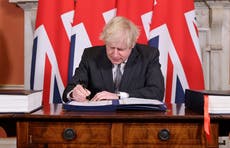For EU citizens living in the UK, the Brexit trade deal does not offer any closure
Despite relief that the UK has managed to leave the transition period with a trade deal, the future offers little hope of reassurance or certainty for millions


Your support helps us to tell the story
From reproductive rights to climate change to Big Tech, The Independent is on the ground when the story is developing. Whether it's investigating the financials of Elon Musk's pro-Trump PAC or producing our latest documentary, 'The A Word', which shines a light on the American women fighting for reproductive rights, we know how important it is to parse out the facts from the messaging.
At such a critical moment in US history, we need reporters on the ground. Your donation allows us to keep sending journalists to speak to both sides of the story.
The Independent is trusted by Americans across the entire political spectrum. And unlike many other quality news outlets, we choose not to lock Americans out of our reporting and analysis with paywalls. We believe quality journalism should be available to everyone, paid for by those who can afford it.
Your support makes all the difference.Following months of gruelling negotiations with the EU, the UK has finally managed to leave the transition period with a trade deal. The set of emotions this has evoked throughout the country has been as wide as the chasm opened by the referendum four years ago – from elation and relief, to acute distress. If there’s one thing that the vast majority of people in Britain have gained, however, it’s a sense of clarity, as they entered this new year knowing the terms and conditions of post-Brexit life.
Nevertheless, for many of the over three million EU nationals living in the UK, such news did not offer a similar type of closure. Since their rights had already been covered in the Withdrawal Agreement, they are subsequently unaffected by this trade deal, meaning that the concerns and challenges they’ve been battling have been carried over into this new year. Faced with a general lack of transparency from the Home Office, rising numbers of Settlement Scheme refusals, a lack of physical proof of status, and the widespread potential for vulnerable individuals to fall through the cracks, the future offers little hope of reassurance or certainty.
To begin with, the EU Settlement Scheme has seen many of the flaws flagged by activists when it was first revealed come to light. The digital scheme was set up in 2019 to allow EU, EEA and Swiss citizens who came to the UK before 31 December 2020 to continue living in the country, with an application deadline of 30 June this year. It offers two different types of status - settled and pre-settled for those without five years of continuous residence in the UK.
The Home Office claims to have received and concluded over 4 million Settled Status applications as of 30 November 2020. These numbers would appear encouraging - if it weren’t for the fact that the scheme double counts individuals who have reapplied, making the actual figure of those granted status far more nebulous.
Even more unclear is the cause of the 29,000 recorded refusals. While the Home Office claims that most of these are on the grounds of being ineligible to apply, and that they are a “last resort” option with individuals having a recourse to appeal, it has declined to provide an exact breakdown. Moreover, we have no idea of just how many applicants have been incorrectly granted pre-settled status, which confers fewer rights than regular settled status.
When one also considers the possibility of numerous European nationals not even being aware that they have to apply in the first place, one can see just how many may inadvertently jeopardise their right to stay and work in the country. Such are the worries of Dr Kuba Jabłonowski, a lecturer at the University of Exeter and research associate of the3million activist group, who stated that “millions of lives are at stake”, as EU citizens “are not starting the year with a clean slate but with a number of concerns.”
To make matters even more alarming, the government has refused to offer physical proof of settled status, creating a serious risk of legal discrimination and bureaucratic chaos – with various instances having already occurred. The experience of Nicoletta Peddis – a 35-year-old York-based Italian who found herself dealing with a letting agent unwilling to accept her digital status – represents merely one example of the numerous adverse consequences that can occur as a result of lacking a physical document.
Such muddy prospects for Europeans’ future in Britain have not left citizens’ rights campaigners with much optimism. Speaking on behalf of the3million, Hedwig Hegtermans claimed that the group remains “very concerned about those who do not realise they could lose all their rights”, while remarking that the government has not “listened [to] or engaged” with their concerns. Alexandra Bulat, co-chair of the group’s Young European Network, has further noted the dichotomy between the greater reassurance Brits have felt following news of the trade agreement, and the “end of the safety net” which EU nationals will encounter. Looking at the psychological and emotional impact of such uncertainty, Elena Remigi, founder of the not-for-profit In Limbo Project - which is collecting testimonies of EU citizens - remarked how such “unresolved issues” have left people in her group still feeling “deeply worried and unsettled”.
Ultimately, while Brits throughout the country may have celebrated – or mourned – the arrival of the new year with a clearer image of what it may hold, EU citizens in the UK continue to be plagued with the same worries they’ve been facing since the beginning of the Brexit process. Last Wednesday, Michael Gove boasted that the “four million” settled status applications represent a “vote in confidence in Britain”, showing just how out of touch the current administration is with European nationals in this country, who were forced to apply for the mere right to stay in their own homes.
If this government truly aims to start 2021 with a spirit of clarity and closure as a result of this new trade deal, it should listen to the concerns of the country’s EU citizens, and give them a slice of that reassurance it purports to have offered us all.



Join our commenting forum
Join thought-provoking conversations, follow other Independent readers and see their replies
Comments